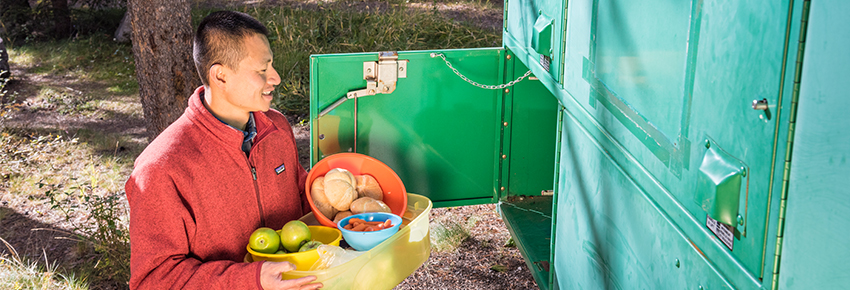
© Scott Munn
“Bare” Campsite Program
Kluane National Park and Reserve
A special effort is being made by park staff and campers to ensure that no wildlife attractants are ever left unattended at any sites in this campground. The "Bare" Campsite program is in place for your safety, and to help keep the wildlife in our National Parks alive and wild.
How to keep a "bare" campsite
If you are camping here, you are agreeing to store all food and food-related items in a hard-sided vehicle / trailer / motor home or in the campground food storage lockers (i.e. not in a tent, tent-trailer or oTENTik) when not in use. This policy applies whenever these items are not in use, at night while you are sleeping, or when your site is unattended for any length of time. When away from your site, you may leave out your camping furniture (e.g. lawn chairs, lanterns, and tents).
A "bare" campsite

Attention pet owners! Please keep pets on a leash at all times. Don't leave pets unattended outside - especially at night. They can attract carnivores such as bears, cougars, wolves, or coyotes, and may be attacked. We are the key to the long term survival of our wildlife.

Food left unattended attracts bears to your campsite. Anything that has an odour or could be considered food may attract wildlife to your site. Never leave any of these items unattended:
- Coolers, full or empty
- Food, open or closed
- Garbage and wrappings
- Dishes and pots
- Pet food and bowls
- Bottles and cans
- Any item associated with food preparation
When people leave their food out, bears and other species can lose their fear of humans. Once an animal gets used to human food, it becomes a risk to public safety, and may be destroyed. By keeping a "bare" campsite, you are playing an important part in preventing the creation of "problem" animals.
Sharing an ecosystem: You are camping within wildlife habitat
Animals rely on every part of this landscape for their survival. Their travel routes, natural food sources, mating grounds, and resting sites don't necessarily stop at the campground boundary! This means you may encounter wildlife at any time. Be aware of your surroundings, especially at dusk and dawn, or in densely vegetated areas. Surprising a bear that is busy feeding on natural food such as berries, for example, can be dangerous.

Wildlife viewing: A word about safety
Seeing wild animals in the park can be a thrilling and rewarding experience, but remember:
- All wild animals are potentially dangerous.
- Never approach, feed, or entice wildlife of any kind, regardless of size.
- Keep a safe viewing distance at all time (30-100 metres).
Related links
- Date modified :